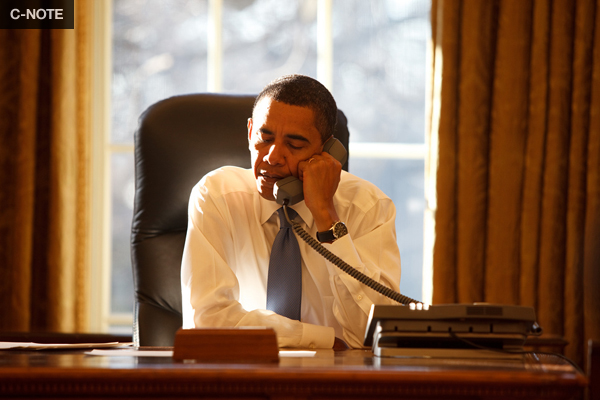Today's speech in Cairo, the most historic of his presidency thus far, is just the latest in a string of smart foreign policy moves that President Obama has made since taking office. He added troops in Afghanistan, brought Russia into the Iran conversation, and has spoken humbly with the Muslim world--something his predecessor was incapable of doing. It's been a good first few months.
But it won't be enough.

At some point down the line--maybe in 6 months, maybe 12--Obama is going to need more than his formidable charm and savvy to realize his foreign policy goals. To curb the nuclear ambitions of Iran and North Korea, to stimulate a viable Israel-Palestine solution, he's going to have to pay. I'm talking cold hard cash. Think of a guy having relationship issues; he might think it's about a lack of communication or a lack of romance, but sometimes all he needs to do to break the stalemate is step up and buy the ring the girl is waiting for. To truly turn around these unstable relationships, Obama is going to have to show them the money.
I know that won't be palatable to many--it's certainly risky to "set" a precedent where we pay our way out of uncomfortable situations. But there's also historical precedent for success. And I know it may seem crazy to spend even more money right now--I'm essentially describing to a foreign policy bailout, one that could top $100 billion. But it might just be most fiscally prudent move he can make.
From North Korea and Iran to Pakistan and Gaza, here are three reasons we'll see foreign policy experts start talking about large cash infusions as a viable option soon.
North Korea Isn't Backing Down Kim Jong-il has spent his entire political life tweaking the U.S. Now that he's in his twilight, you think he's going to back down? Sure, he just named his son his successor. But don't let that fool you. It's going to take serious investment in the North Korean economy--the kind of investment that can turn it into the next South Korea, maybe $10 billion per year for several years--for Kim to give up now.
It's Worked Before America started giving economic aid to Egypt in 1975, a few years before the historic peace talks between Anwar Sadat and Menachem Begin at Camp David. Once Jimmy Carter was able to get the two to strike a deal, aid to Egypt increased dramatically; the U.S. has handed over more than $50 billion since. Do you think Sadat--who almost left the talks without signing and was seen as a traitor in much of the Muslim world--would have agreed without the cash on the table? Me neither.
The Alternative? Pay More Later--Much More The reality is that the current nuclear showdowns won't be resolved by Bush-like military adventures or Obama's hard power combined with dogged diplomacy. Indeed, if Obama lets the situations in North Korea or Iran linger much longer, he is likely to eventually be drawn into military action--as North Korea goes after South Korea, Israel goes after Iran, or any of a number of other bad scenarios play out. It may seem counterintuitive to suggest that he spend more cash, especially after what I wrote this week about G.M. But with wars costing $1 trillion and annual U.S. defense spending inching towards another trillion, $100 billion in "preemptive foreign aid" will be money well spent.
Cross-posted at The Stimulist
p.s. If you liked this, read up on what the G.M. money says about our values, why Hillary was Obama's best move in the first 100 days, and from the White House over next few months, and why the Dems could be in trouble.